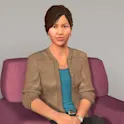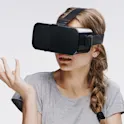
Robotics and AI
12 Oct 2017
Virtual humans can identify post-traumatic stress in soldiers
Soldiers are more likely to open up to a computer-generated virtual interviewer than by taking a survey, say researchers in Frontiers in Robotics and AI

Robotics and AI
12 Oct 2017
Soldiers are more likely to open up to a computer-generated virtual interviewer than by taking a survey, say researchers in Frontiers in Robotics and AI

Neuroscience
18 Jul 2017
Can a self-driving vehicle be moral, act like humans do, or act like humans expect humans to? New study has found that human morality can be modeled.

Humanities
05 Jul 2017
Frontiers in Digital Humanities research analyzes the rise of immersive journalism and its challenges

Robotics and AI
25 Oct 2016
“I still find immersive Virtual Reality as thrilling now as when I first tried it 20 years ago,” writes Professor Mel Slater, Field Chief Editor of Frontiers in Robotics and AI, on his personal blog. Slater, recipient of the IEEE VGTC’s 2005 Virtual Reality Career Award, is ICREA Professor and Head of the Event Lab at Barcelona University and part-time Professor of Virtual Environments at UCL. Here, we talk to him about his research, technical advances and challenges in the field, and how virtual reality can help raise awareness about sustainability and global change. VR as a research tool A major focus of research for Slater and his team is to use VR as a tool in psychology and neuroscience. Many interesting questions can’t be studied in real life, because they are dangerous or distressing to the participants. But in VR, you can safely simulate the situation, and gauge people’s response. For example, “We did a study where we look at (…) an important area in social psychology called the bystander problem: if you see two other people who start fighting, (…) do you run away, do you try to intervene? (…) This is very hard to study in physical reality, but in virtual reality you can.” In […]

Robotics and AI
30 Oct 2015
Frontiers Science Hero: Mel Slater from Frontiers on Vimeo. Prof. Mel Slater has always been intrigued by the science that lies behind virtual reality. “I think one of the things that fascinated me about it was the question why people, when they go into a virtual reality even though what they see may not look real, they nevertheless have a strong illusion that what is happening is real and also a strong illusion that they are in the virtual place,” he said. Mel Slater is an ICREA Research Professor at the University of Barcelona, and became Professor of Virtual Environments at University College London in 1997. Slater started working in the area of virtual reality during the early 1990s with the aim of understanding our mindset when it comes to a virtual world. “I set out to try to understand why this illusion happens and what factors we as engineers can introduce into our applications to promote those feelings and realistic responses to virtual reality,” he said. The power of virtual reality Throughout his career, Slater has made several important discoveries. “I was one of the first people in this field who worked in this area of understanding the impact […]
Get the latest research updates, subscribe to our newsletter